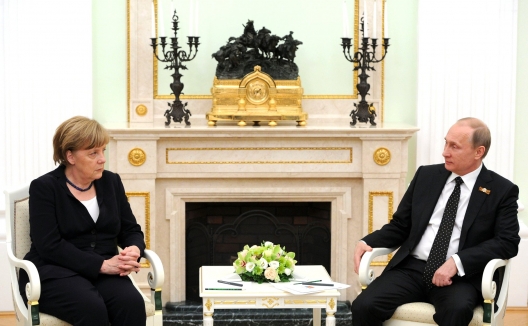 Unless Europe and the United States act swiftly, the situation in Ukraine is about to get worse — possibly a lot worse. …
Unless Europe and the United States act swiftly, the situation in Ukraine is about to get worse — possibly a lot worse. …
A renewed Russian military offensive now appears to be in the offing. Russian forces are once again massing at the border with Ukraine, and Russian troops and heavy equipment have continued to flow into eastern Ukraine. Russian forces have been training Moscow-backed separatists for months. All is set for a rapid military advance — most probably to take the strategic port of Mariupol and the remainder of the Donbass region, though further advances towards Odessa and possibly the creation of a land bridge to Crimea cannot be excluded….
The dangers are real, which makes it imperative that the major western countries do whatever they can to prevent Putin’s next military move against Ukraine. The focus should not be on what to do if Putin does move, but how to deter him in the first place. That will require renewed focus, urgency, and determination — something that has been lacking so far. Rather than warning of further sanctions if Putin escalates, the United States and Europe need to spell out specifics — for example, banning Russian banks from participating in the SWIFT mechanism, which manages international banking transactions, and halting all exports of technologies for the Russian oil and gas industry.
The Western powers should also be clear that if the conflict escalates, they will be prepared to provide defensive lethal support to Ukraine — including drones, secure communications, reinforced troop carriers, long-range counterbattery radar, and anti-armor weaponry. While not enough to turn the tide of a major confrontation, such weaponry would help Ukraine impose significant cost on Russian forces and on the separatists Moscow is enabling to fight.In addition to threats of economic and military countermeasures, there needs to be a major new diplomatic push aimed not just at any escalation, but at trying to settle the conflict. This requires direct U.S. and British involvement. Their absence from the most important security negotiation in Europe is historically unprecedented; they now need to join Germany, France, Russia, and Ukraine in an effort to find a lasting solution.
Such a solution must restore Ukraine’s territorial integrity, full sovereignty, and independence, create an agreed process for internal political reform and decentralization, strengthen economic relations with Ukraine, and end the sanctions regime. It likely will require the deployment of an outside peacekeeping or stabilization force — to ensure heavy weapons are withdrawn, all foreign forces return home, irregular forces are disbanded, the Russian-Ukrainian border is secure, and conditions for conducting free and fair elections of local authorities in eastern Ukraine are in place.
Ivo Daalder, President of the Chicago Council on Global Affairs, is a former U.S. Ambassador to NATO. Malcolm Rifkind is a former British Foreign Minister and former Secretary of State for Defense.
Image: German Chancellor Angela Merkel and Russian President Vladimir Putin, May 10, 2015 (photo: Office of the President of Russia)
